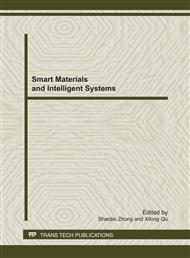[1]
Q. Kang, L. Wang, J. An, et al, Swarm intelligent computation [J]. Journal of Shanghai University (Natural Science), 2009, 10(10): 73-76.
Google Scholar
[2]
E. Bonabeau, M. Dorigo, G. Theraulaz, Inspiration for optimization from social insect behavior [J]. Nature, 2010, 406(6): 39-42.
DOI: 10.1038/35017500
Google Scholar
[3]
X. Peng, Y. Peng, Y. F. Dai, Swarm intelligence theory and applications [J]. Acta Electronica Sinca, 2003, 31(12A): 1982-(1988).
Google Scholar
[4]
Y. Lu, Ant colony optimization and its applications in power system [J]. Transactions of China Electrotechnical Society, 2009, 18(4): 70-74.
Google Scholar
[5]
X. H. Yuan, A survey on application of particle swarm optimization to electric power system [J]. Power System Technology, 2004, 28(19): 14-19.
Google Scholar
[6]
J. Kennedy, R. C. Eberhart, Swarm intelligence [M]. San Francisco: Morgan Kaufmann Publisher, (2008).
Google Scholar
[7]
E. Bonabeau, M. Dorigo, G. Theraulaz, Inspiration for optimization from social insect behavior [J]. Nature, 2002, 406(6): 39-42.
DOI: 10.1038/35017500
Google Scholar
[8]
M. M. Millonas, Swarms, phase transitions, and collective intelligence [A]. Proceedings of Artificial Life III [C] (C. G. Langton, ed. ) Santa Fe Institute: Addison-Wesley, 1994: 417-445.
Google Scholar
[9]
M. Dorigo, V. Maniezzo, A. Colorni, The ant system: optimization by a colony of cooperating agents [J]. IEEE Transactions on Systems, Man, and Cybernetics-Part B, 1996, 26(1): 29-41.
DOI: 10.1109/3477.484436
Google Scholar
[10]
R. C. Eberhart, Y. Shi, Particle swarm optimization: developments, applications and resources [A]. Proceedings of the 2001 Congress on Evolutionary Computation [C], Seoul, South Korea, 2001: 81-86.
DOI: 10.1109/cec.2001.934374
Google Scholar
[11]
T. Li, Computer immunology [M]. Publishing House of Electronics Industry, Beijing, China. (2004).
Google Scholar
[12]
M. Dorigo, L. M. Gambardella, Ant colony system: a cooperative learning approach to the traveling salesman problem [J]. IEEE Transactions on Evolutionary Computation, 1997, 1(1): 53-66.
DOI: 10.1109/4235.585892
Google Scholar
[13]
S. Y. Li, Progresses in ant colony optimization algorithm with applications [J]. Computer Measurement & Control, 2003, 11(12): 911-913.
Google Scholar
[14]
W. Yang, Q. Q. Li, Survey on particle swarm optimization algorithm [J]. Engineering Science, 2004, 6(5): 87-94.
Google Scholar
[15]
Y. H. Hou, Economiic dispatch of power systems based on generalized ant colony optimization method[J]. Proceedings of the CSEE, 2003, 23(3): 59-64.
Google Scholar


